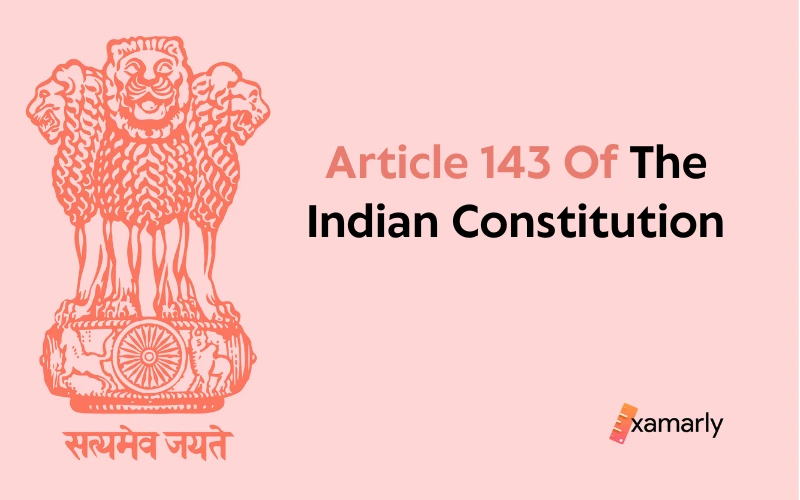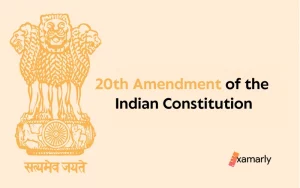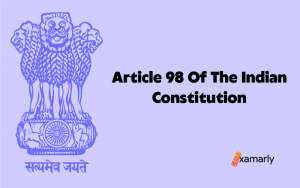The President of India has the authority to seek advice from the Supreme Court, as outlined in Article 143 of the Indian Constitution.
The 28th of January 1950 saw the establishment of the Supreme Court of India. It took the position of the highest court in India, the Judicial Committee of the Privy Council, as well as the Federal Court of India. The judgments handed down by the High Courts and other state and territorial courts can be appealed all the way up to the Supreme Court, which is the highest court that can hear such cases.
- Article 143 Of The Indian Constitution
- Cases
- Key Points
- Conclusion
- FAQs On Article 143
- What Is The Origin Of Article 143?
- What Is The Scope Of Clause 1 Of Article 143?
- Is Supreme Court Posses Discretion Authority In Line With Article 143?
- Which Amendment Has Amended Article 143?
- Which Article Gives Advisory Jurisdiction To Supreme Court?
- To Whom Article 143 Gives The Power To Seek Advice From Supreme Court?
- When Article 143 Was First Used?
- Is The Court Bound To Give Its Opinion?
- How Many Times Article 143 Is Used?
Article 143 Of The Indian Constitution
According to the constitutional provisions of Article 143 of the Indian Constitution, the President of India is entitled to consult the Supreme Court for advice. The provisions of the said Article are as follows:
- If at any time, it seems prudent to seek the Supreme Court’s opinion on a question of law or factual matter that has come up or is expected to come up and is of significant public importance, the President may refer the matter to the court for consideration. After holding whatever hearings it deems necessary, the Supreme Court may then convey its decision to the President.
- No matter what the proviso to article 131 says, the president has the authority to refer a disagreement of the sort indicated in the said proviso to the supreme court for a ruling. The supreme court will then transmit its decision to the president after holding any hearing it deems necessary.
Remark: The composition of the Supreme Court of India as well as its legal authority are spelled out in the Constitution of India in articles 124 through 147. Check out the linked articles to learn about them for preparing for UPSC CSE.
Note: Article 143 deals with the “power” of the President rather than the “jurisdiction” of the Supreme Court. It alludes to consultation rather than any sort of adjudication. There will be no ruling, decree, or order; instead, the President will receive a report with the opinion.
However, the Supreme Court would still be free to revisit and, if necessary, overturn the position expressed in an opinion according to Article 143. (1). The Cauvery Water Disputes Tribunal ruled in 1992 that it was not permitted to use its authority under Article 143(1) to review any of its prior judgments. Article 137 of the Constitution is the sole constitutional provision that allows for this to be done.
Cases
The advisory competence mechanism has not been used very much so far. In fact, there have been only twelve such instances. The advisory opinion itself has great persuasive value.
- Gujarat Assembly Election Matter, AIR 2003 SC 87
- Re on Principles and Procedure regarding the appointment of Supreme Court and High Court Judges, AIR 1999 SC 1
- Re in the matter of Ram Janamabhoomi, (1993) 1 SCC 642
- Re in the matter of Cauvery Water Dispute Tribunal, AIR 1992 SC 522
- In re Special Courts Bill, AIR 1979 SC 478
- In re Presidential Poll, AIR 1974 SC 1682
- In re Keshav Sing’s Case, AIR 1965 SC 745
- In re the Sea Customs Act, AIR 1963 SC 1760
- In re Berubari (Indo-Pakistan Agreements), AIR 1960 SC 845
- In re New India Motors Ltd. v. Morris, AIR 1960 SC 875
- In re the Kerala Education Bill, AIR 1958 SC 956
- In re the Delhi Law Act, AIR 1951 SC 332
As the Election Commission and the Government of Gujarat were at odds over the state’s 2002 elections, then-President Dr. Abdul Kalam approached the Supreme Court under Article 143 for guidance in August of that year. The questions included the restrictions placed on the Election Commission’s power by Article 324, how Article 174 affected the Commission’s authority and jurisdiction, and whether the Commission may suggest that a state adopt the President’s rule.
In circumstances that it deems improper or unsuitable for such an exercise, the Supreme Court may choose not to provide its decision as required by Article 143. However, the Supreme Court ruled that in that case, reasons had to be provided (M. Ismail Faruqui v. Union of India, AIR 1995 SC 605).
Key Points
- By making a reference pursuant to Article 143(1) of the Indian Constitution, the Supreme Court cannot be asked to revisit its prior rulings. However, the President may refer to any legal issue that the Court has not previously addressed. Unlike the adjudicatory jurisdiction, the advisory jurisdiction cannot be used to transform it into either the appellate or review jurisdiction of the Supreme Court. The court determined that it would seriously erode the judiciary’s independence in the Cauvery Water Disputes case (AIR 1992).
- In accordance with Article 143(1) of the Constitution, the Supreme Court is not permitted to inquire further than the President’s reference. However, the fact that the President has only addressed some questions about the legality of a bill or act, and not others that also appear to be relevant, is not a sufficient justification for refusing to take the referral into consideration. (In Re Kerala Education Bill, 1958 AIR SC 956)).
- In accordance with its discretion, the Apex Court may report its opinion to the President in accordance with Article 143(1) of the Constitution after any hearing it deems appropriate. However, Article 143(2) of the Constitution contains a mandatory requirement that the Supreme Court report its opinion to the President in the event of a dispute of the type mentioned in Article 131 Proviso of the Constitution.
- Article 143 has been modified by the 7th amendment to the Indian Constitution.
Conclusion
The advisory jurisdiction of the Supreme Court of India is defined in Article 143 of the Constitution. The Constitution provides that the President is authorized to refer any question or matter to the Supreme Court for an advisory opinion. This is referred to as a Presidential Reference.
The advisory opinion of the Supreme Court is not binding. Instead, it is merely a consultation. The opinion may or may not be followed by the government.
The President can ask the Supreme Court for an advisory opinion on any issue, but the Court can refuse to provide an opinion.
The main attraction of the advisory jurisdiction of the Supreme Court is that it can advise the President on issues of public importance. This is because the Supreme Court is a constitutional authority that entertains matters of public interest.
FAQs On Article 143
What Is The Origin Of Article 143?
The provision of Article 143(1) of the Constitution is based on Section 213 of the Government of India Act, 1935. However, there is a significant difference between the two provisions. Under the Government of India Act, of 1935, only a question of law may be addressed to the Federal Court. Under Article 143(1) of the Constitution of India, however, either a question of law or a matter of fact may be referred to the Supreme Court for guidance.
What Is The Scope Of Clause 1 Of Article 143?
The ambit of Article 143(1) is extremely broad. There is no need that the President can only refer inquiries that have to do with his, or the Central Government’s, rights, responsibilities, or duties. A question of law or fact that the President deems to be of such a nature and of such public significance that it is expedient to acquire the Court’s view may be submitted to the Supreme Court for a ruling.
Is Supreme Court Posses Discretion Authority In Line With Article 143?
In accordance with the provisions of Article 143(1) of the Constitution, the Supreme Court possesses the discretionary jurisdiction to report such opinions to the President. This authority has been exercised by the President of India on a very limited scale and only in exceptional circumstances.
Which Amendment Has Amended Article 143?
7th Constitutional amendment has revised Article 143 of the Indian Constitution.
Which Article Gives Advisory Jurisdiction To Supreme Court?
Article 143 of the Constitution specifies the Supreme Court of India’s advisory authority. According to the Constitution, the President is permitted to ask the SC for advice on any issue or topic. The term “Presidential Reference” is used to describe this.
To Whom Article 143 Gives The Power To Seek Advice From Supreme Court?
Article 143 grants the authority to the President of India to seek advice from the SC.
When Article 143 Was First Used?
The first instance of an Article 143 reference was in the Delhi Laws case (1951 SCR 747).
Is The Court Bound To Give Its Opinion?
The Supreme Court is not required to provide its opinion in any case. Instead, the Supreme Court has the option to reject to offer its decision pursuant to Article 143 in situations it deems improper or unsuitable for such an exercise.
How Many Times Article 143 Is Used?
In almost sixty years, the President has invoked Article 143 of the Constitution precisely twelve times to get the opinion of the Supreme Court.






